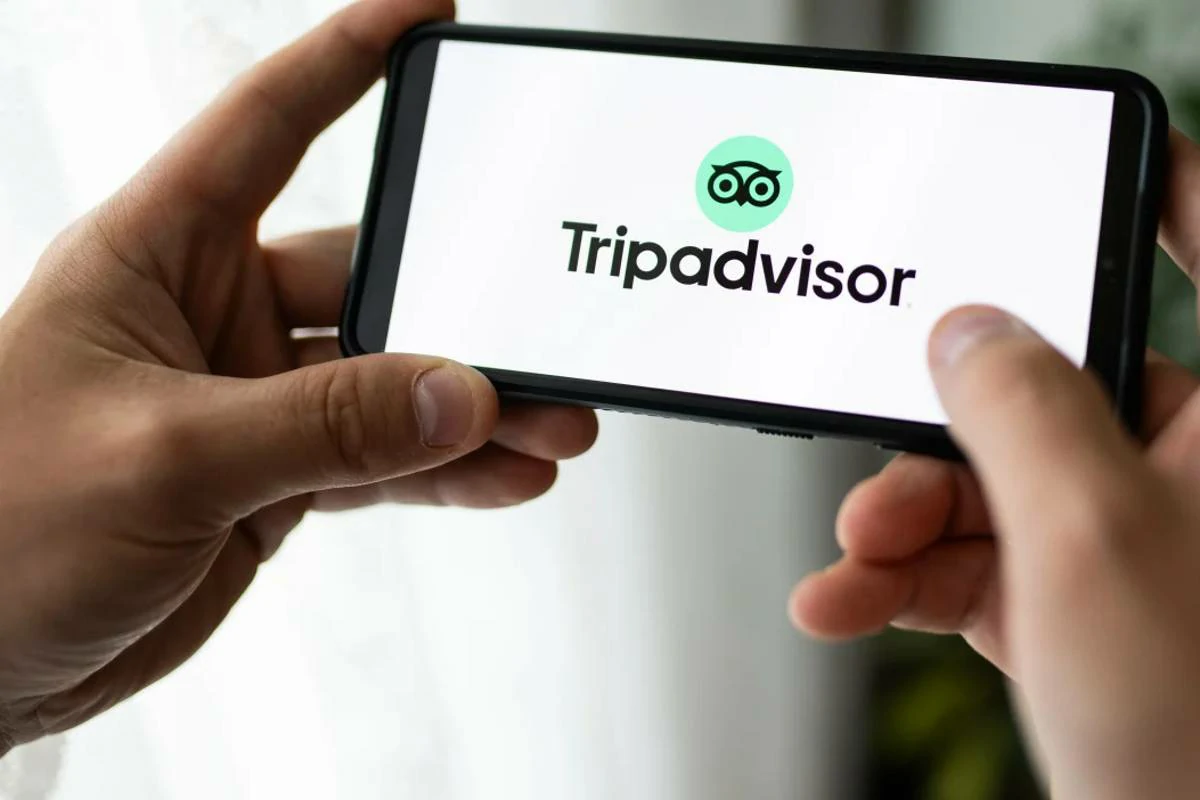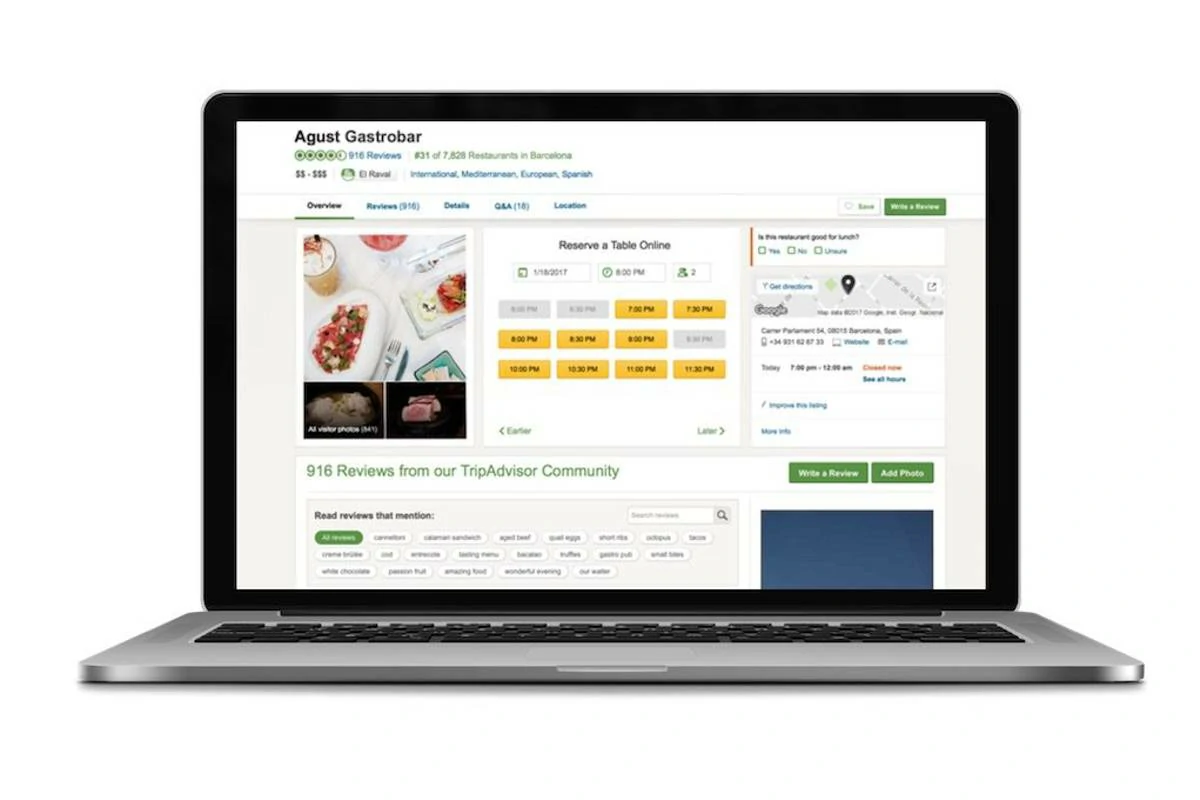Is TripAdvisor Legit? Answer is – TripAdvisor is a legitimate travel website offering a massive collection of user-generated reviews and booking options for accommodations, tours, and experiences. However, like any platform relying on user content, it’s essential to be aware of both the benefits and potential issues like fake reviews or outdated information.
Summary
- TripAdvisor has a vast database of reviews and information on destinations worldwide.
- Reviews can be biased, either overly positive or negative, so critical reading is important.
- Businesses may manipulate reviews, so be wary of overly glowing or consistently poor ratings.
- TripAdvisor’s booking tools offer convenience but it’s worth comparing prices directly with hotels or tour operators.
Is TripAdvisor Legit?

What is TripAdvisor?
TripAdvisor needs little introduction. This travel giant has become synonymous with online reviews, destination guides, and convenient booking options.
Founded in 2000, TripAdvisor operates as a user-generated content platform, meaning its backbone is formed by the millions of reviews, photos, and forum posts contributed by travelers worldwide.
Here’s a breakdown of TripAdvisor’s core features:
Reviews and Ratings: The heart of TripAdvisor lies in its massive database of reviews on hotels, restaurants, attractions, tours, and experiences. Users can submit detailed star ratings, textual reviews, and photos to help others make informed decisions.
Price Comparison: TripAdvisor offers price comparison tools for flights and accommodations. This allows you to quickly find potential deals and compare options before booking.
Travel Forums: TripAdvisor’s active forums are treasure troves of information. You can ask questions, get recommendations from seasoned travelers, and connect with those who share your interests.
Booking Tools: On top of reviews, TripAdvisor has direct booking capabilities. This often includes ‘best price’ guarantees and the convenience of managing your reservations within its ecosystem.
Destination Guides: TripAdvisor curates destination guides with information on popular attractions, local tips, itineraries, and more.
Sarah Evans Expert Opinion
“TripAdvisor revolutionized how we plan travel. It democratized word-of-mouth recommendations and brought a level of transparency to the traditionally opaque world of hotel and tour bookings.” – Sarah Evans, Founder of ‘The Global Tourist’ Travel Blog.
Is TripAdvisor Legit?
The short answer is yes, TripAdvisor is a legitimate company with a significant presence in the travel industry.
However, that doesn’t automatically make it the best or most reliable tool for every travel decision. Understanding the nuances of this platform is key.
1. The Pros
Large database of reviews and photos: TripAdvisor’s sheer volume of user-generated content is its primary asset. Few other platforms offer such an extensive collection of first-hand experiences across hotels, restaurants, and attractions worldwide. This database provides invaluable insights when comparing options.
Price comparison tools for hotels and flights: TripAdvisor’s price comparison features can be a time-saver. It quickly shows you available rates across various booking platforms, helping you identify potential deals. However, always remember to compare these prices directly with the hotel or airline, as sometimes better rates are offered.
Forums for traveler advice and questions: TripAdvisor’s forums are a lively hub of information exchange. Tap into the collective wisdom of experienced travelers by asking destination-specific questions, finding insider tips, and connecting with those planning similar trips.
2. The Cons
Potential for fake or manipulated reviews: The bane of review-based platforms is the presence of fake or manipulated reviews. Businesses may incentivize positive reviews or attempt to discredit competitors with negative ones. TripAdvisor has measures to combat this, but it’s an ongoing challenge.
Outdated information: With content submitted by users, there’s always a risk of outdated information. A hotel may have renovated, a tour operator might have changed its route, or prices could have fluctuated. Double-check important details with the official provider before making decisions.
Booking through TripAdvisor may not always guarantee the best price: While the booking tools are convenient, TripAdvisor sometimes acts as a middleman. This can mean slightly higher prices or additional fees compared to booking directly with the hotel or tour operator. It’s always wise to directly compare rates for the best deal.
James Henderson Expert Opinion
“The biggest pitfall with TripAdvisor is when travelers blindly trust reviews without critical assessment. Think of it as a valuable tool within your research arsenal, not the sole deciding factor.” – James Henderson, Travel Industry Analyst and Columnist.
How to Use TripAdvisor Wisely

TripAdvisor can be a fantastic asset, but it’s like any tool – you need to know how to wield it effectively. Here’s the key to unlocking its true potential:
1. Reading Reviews Critically
Don’t simply skim reviews; dissect them with a discerning eye.
Look for consistency and patterns: Do multiple reviews mention the incredible breakfast buffet or the noisy rooms facing the street? These recurring themes offer stronger clues about the true experience than any single review.
Be wary of overly glowing or excessively negative reviews: Extremes, especially from reviewers with very few contributions, can be red flags. Look for balanced reviews that discuss both pros and cons, as they tend to be more realistic.
Check reviewer profiles: A seasoned traveler with a history of thoughtful reviews carries more weight than a first-time reviewer with a single rant or a suspiciously effusive comment. You can also see if their travel style matches yours – a budget backpacker’s concerns may differ vastly from a luxury hotel enthusiast.
2. Cross-Referencing Information
TripAdvisor is a powerful starting point, not your single source of truth.
Compare TripAdvisor with other review sites: Platforms like Google Reviews, Yelp, or specialized sites like Booking.com offer additional perspectives. A consistent pattern of complaints or praise across multiple platforms holds more weight.
Check official websites of hotels or tour operators: Verify details on the provider’s website. Prices, specific room amenities, or what’s included on a tour may be more accurately reflected there than in older user reviews.
3. Booking Considerations
While convenient, booking directly through TripAdvisor isn’t always the most cost-effective method.
Compare prices directly with providers: Before hitting that “book now” button, take the extra minute to compare prices on the hotel or tour operator’s website. Sometimes they offer direct booking discounts or special promotions.
Be aware of cancellation policies and fees: Understand the fine print before confirming any reservation, whether it’s through TripAdvisor or the provider directly. Some bookings on TripAdvisor may have stricter policies or added fees to be aware of.
Emily Thomas Expert Tip
“Never underestimate the power of human interaction. For important trips, especially those involving complex logistics, calling the hotel or tour operator directly can make a world of difference. You can ask specific questions, clarify details, and sometimes even negotiate better rates.” – Emily Thomas, Owner of Bespoke Journeys Travel Agency
What Does “Legit” Mean for TripAdvisor?

When we ask if something is “legit,” we usually fall into one of two buckets:
- Is it a real, operating company? Yes, TripAdvisor is absolutely a legitimate company in this sense. It’s a publicly traded, long-standing business within the travel sector.
- Is it trustworthy and reliable? Here is where things get interesting. It depends on how you define reliable and how you intend to use the platform. Let’s break it down:
1. Is TripAdvisor a scam?
No, TripAdvisor does not operate as a scam designed to intentionally defraud customers. They provide a platform with genuine features and booking capabilities.
However, the issues lie primarily with the nature of its key feature: user-generated content.
2. The legitimacy of user-generated content
The heart of TripAdvisor lies in the reviews and ratings contributed by its massive user base. This presents inherent challenges:
Manipulation: Unfortunately, not all reviews are genuine. Businesses sometimes attempt to boost their own reputations with fake positive reviews or sabotage competitors with negative ones. TripAdvisor has systems for detecting fraud, but it’s an ongoing battle.
Bias: Every traveler has their own needs, expectations, and subjective experiences. A rave review from one person might be irrelevant to you if your priorities are different. Reviews are inherently filtered through personal lenses.
Outdatedness: Information on TripAdvisor isn’t always updated in real-time. Hotels renovate, restaurants change menus, and tour routes get adjusted. Old reviews might not reflect current reality.
3. When should you trust TripAdvisor?
TripAdvisor can be a valuable tool when used with the right mindset. Trust it most for:
Trendspotting: Focus on common patterns across many reviews. If a hundred people note fantastic service at a hotel, it’s likely a genuine strength, despite some potential negative outliers.
Inspiration: TripAdvisor excels at surfacing destinations, hotels, or experiences you might not have been aware of. It’s great for those initial “where should I go?” exploration phases.
Comparative Research: Its price comparison tools and review collation make it a handy tool to use alongside other research methods – not as your sole source.
Dr. Susan Jones Expert Opinion
“TripAdvisor isn’t about finding absolute truth. Think of it like a large-scale word-of-mouth network with all the accompanying benefits and potential pitfalls of personal opinions.” – Dr. Susan Jones, Professor of Tourism and Hospitality Management
Alternatives to TripAdvisor

Other Review Platforms
Each platform boasts its own strengths and focuses, so consider what’s most important to you:
Google Reviews: Often integrated directly into Google Maps listings, Google Reviews offer a vast amount of traveler feedback. The ease of leaving a review directly on your map search results makes it a popular contributor pool.
Yelp: Initially known for restaurant reviews, Yelp has expanded to cover hotels, attractions, and local services. It’s a good option for in-depth, locally-focused information in major cities.
Booking.com: Primarily a booking platform, Booking.com heavily emphasizes “verified” reviews written only by guests who have actually booked through their site. This helps minimize fake review issues.
Trustpilot: Focuses on trustworthiness and transparency. It actively solicits reviews from customers, making it potentially less prone to “self-selection bias” where only very happy or angry people leave feedback.
Niche Platforms: Specialized sites exist for specific travel needs: Oyster.com for luxury hotels, CruiseCritic for cruises, or AllTrails for hiking, biking, and outdoor activities.
Local Tourism Boards or Travel Blogs
Think beyond traditional review aggregators and tap into these resources:
Official Tourism Websites: Most countries, regions, and even cities have official tourism boards with websites full of information. Unlike TripAdvisor, these sites are curated, offering more reliable details, events calendars, and even suggested itineraries.
Travel Blogs & Vlogs: Independent travel bloggers and vloggers often provide in-depth narratives, stunning photos, and videos, and honest opinions less common on aggregated review sites. Find bloggers whose style and interests align with yours.
Social Media: Platforms like Instagram, YouTube, and niche travel-focused subreddits can uncover hidden gems and offer a more “boots on the ground” perspective from fellow travelers.
Alex Parker Expert Tip
“The best travel planning is often a patchwork approach. TripAdvisor can be a piece of that puzzle, but don’t discount the power of local tourism websites for official information or the intimate perspective independent travel bloggers can provide. ” – Alex Parker, Founder of ‘The Wayward Compass’ travel blog
Conclusion
TripAdvisor, like any powerful tool, is most effective when you understand its strengths and limitations. It’s undeniably a travel industry giant with vast resources at your fingertips. However, the key to unlocking its true value lies in approaching it strategically.
Remember these takeaways:
- Critical Thinking is Key: Never rely on TripAdvisor alone. Cross-reference its information, read reviews with a discerning eye, and focus on identifying trends.
- A Piece of Your Research Puzzle: Treat it as one valuable piece among your arsenal of travel planning tools, alongside official websites, other review platforms, and independent travel content.
- Your Needs Matter: TripAdvisor might be perfect for some situations (initial inspiration, price comparisons) and less ideal for others (making major decisions based solely on reviews).
- Alternatives Abound: Don’t be afraid to explore other review platforms, local resources, and travel blogs to get diverse and in-depth perspectives.
By adopting a savvy, balanced approach, you can leverage the positives of TripAdvisor without falling prey to potential pitfalls, ultimately leading to better-informed and more fulfilling travel experiences.
FAQs
Q: Is it ever safe to book through TripAdvisor?
Yes, TripAdvisor’s booking tools generally are safe. However, it’s always wise to compare prices directly with the hotel or tour operator to ensure you’re getting the best deal and understand their cancellation policies fully.
Q: Are there ways to spot fake reviews on TripAdvisor?
While no method is foolproof, look for these red flags: overly glowing or excessively negative language, reviewers with very few contributions, and reviews that seem generic or lack specific details. TripAdvisor does have fraud detection systems, but some slip through the cracks.
Q: Can I leave my own reviews on TripAdvisor?
Absolutely! TripAdvisor thrives on user contributions. After a trip, share your honest, balanced review to help future travelers.
Q: Are smaller businesses at a disadvantage on TripAdvisor?
Some argue that businesses with large marketing budgets can manipulate the system. However, smaller businesses can also shine based on genuine, positive reviews. Focus on providing excellent service and encouraging satisfied guests to leave feedback.
Q: Does TripAdvisor influence search engine results?
Yes, TripAdvisor’s popularity and well-established domain authority mean its pages often rank highly in search results for travel-related queries.







